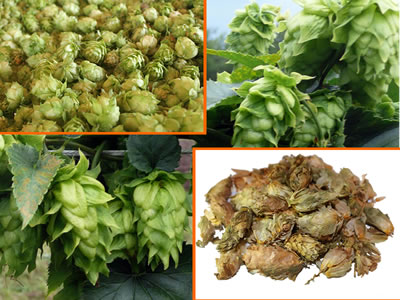Hop (Hops, Humulus lupulus) is a natural sedative herb that is used for treating insomnia, anxiety, nervousness, irritation and restlessness. Hop is a bitter herb that is diuretic, calming and sedative. Hops have historically been used as an natural sleep inducer for its sedative effects.
Hop has a bitter, tangy flavor. It is used as a flavoring and stability agent in beer. Humulus lupulus has been used to make beer for thousands of years in Asia. The earliest literature shows that hop was used in Babylon before 200 AD. Later, this herb was introduced to Europe. In Europe, the first mention of hop being used to beer was in 1079. In France in 1268, the law of King Louis IX stated that beer should only be allowed to contain good malt and hops. In the Netherlands, hop was used in beer by breweries in the early fourteenth century. In the Middle Ages, the hopped beer became popular and was heavily consumed.
Hop for sleep disorders
Other than the use in beer industry, hop is a well known herbal medicine for treating sleep disorders. Hop has similar effects as valerian. It is used in treatment for anxiety, restlessness, and insomnia. Hop contains volatile oil, two Lupamaric acids, cholene and other compounds. volatile oil produces sedative and soporific effects, and the Lupamaric acid or bitter principle is stomachic and tonic. So hop has tonic, nervine, diuretic and anodyne properties. Scientists believe that the relaxing effect of hops may be partially due to the specific chemical component dimethylvinyl carbinol. Modern studies have confirmed the sedating effects of humulus lupulus.
In a randomized, double-blind, controlled clinical trial reported in 1998, researchers compared a hop-valerian preparation with a benzodiazepine preparation in parallel group of patients suffering from sleep disorders. The study shows that the hop-valerian preparation in the appropriate dose is a sensible alternative to benzodiazepine for the treatment of nonchronic and non-psychiatric sleep disorders.
In another study published in 2004, the volunteers (16 in each group) received either placebo or verum (containing the valerian-hops extract). The valerian-hops medication was capable of reducing or inhibiting the arousal induced by caffeine. The study leads to a conclusion: the valerian-hops extract acts via a central adenosine mechanism which is possibly the reason for its sleep-inducing and -maintaining activity.
According to a study published in 2006, researchers studied on humulus lupulus extracts for sedating activity. The both of two preparations reduced the spontaneous locomotor activity, increased the ketamine-induced sleeping time and reduced body temperature. The study confirmed that humulus lupulus has a central sedating effect.
How to use hop
Dried hops are use for medicinal purposes. When using hops, please note, aged hops are less effective than the new ones, because the herb exposes to light or air for a few months will lose its medicinal potency. So hops should be stored in a air-tight container in a dark place.
1. Hop pillow
– Fill a pillow with dried hops
– Sleep with the pillow
– This is an effective remedy for sleeplessness
2. Hop tea
– Dried hops 15g
– Boiling Water 2 cups
– Steep for 15 minutes
– Drink 1 cup, twice a day
– This remedy can help relieve sleep disorders, and promote digestion, and cleanse liver
3. Hop tincture
– Dried hops 100g
– Alcohol (35%-85%) 500ml
– Soak the herb in the alcohol
– Leave for 4 weeks
– Strain and store in a bottle
– Drink 20ml with a cup of water, 1-2 times a day
– This remedy is effective to relieve insomnia and improve appetite
Hop can be used alone, or combined with other herbs, such as valerian. Today there are many supplement products containing hop for sleep disorders. You may find hops in forms of tablets, capsules, teas or liquid extracts in a health supplement store.
Although no major side effects have been reported in using hops, but before taking hops as a remedy, you should consult your doctor and follow the instructions on the label of the products.
References
- Comparative study for assessing quality of life of patients with exogenous sleep disorders (temporary sleep onset and sleep interruption disorders) treated with a hops-valarian preparation and a benzodiazepine drug, Institut fur Psychosomatik, Wien. Wien Med Wochenschr. 1998
- The Fixed Combination of Valerian and Hops (Ze91019) acts via a Central Adenosine Mechanism, Planta Med. 2004
- La Pense, Clive, The Historical Companion to House Brewing, Montag Publications, Beverly, England, 1990
- Sedating effects of Humulus lupulus extracts, Phytomedicine. 2006



